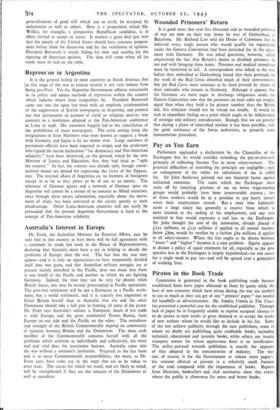IRepress'on in Argentina
It is the general feeling in most countries in South America that Iat this stage of the war to remain neutral is not very remote from
[being pro-Nazi. Yet the Argentine Government adheres tenaciously to its policy and adopts methods of repression within the country which indicate where their sympathies lie. President Roosevelt
came out into the open last week with an emphatic condemnation of the .suppression of Jewish newspapers in Argentina, and pointed out that persecution on account of racial or religious motives was contrary to a resolution adopted at the Pan-American conference 'at Lima in 1938. His statement happily led to the cancellation of the prohibition of these newspapers. The crisis arising from the resignations of three Ministers who were known to support a break with Germany and Japan is by no means over. Large numbers of permanent officials have been required to resign, and the professors who signed the recent declaration " for democracy and Pan-American solidarity " have been dismissed, on the ground, stated by the new Minister of Justice and Education, that they had tried to " split the country." In fact, the country was already split, though consti- tutional means are denied for expressing the views of- the Opposi- tion. The internal affairs of Argentina are no business of foreigners except in so far as they prove to be of use to an enemy. The tolerance of German agents and a network of German spies on Argentine soil cannot be a matter of no concern to Allied countries, since through these means information, especially about the move- ment of ships, has been conveyed to the enemy greatly to their disadvantage. Other Latin-American countries will not easily be persuaded that the present Argentine Government is loyal to the concept of Pan-American solidarity.


























 Previous page
Previous page